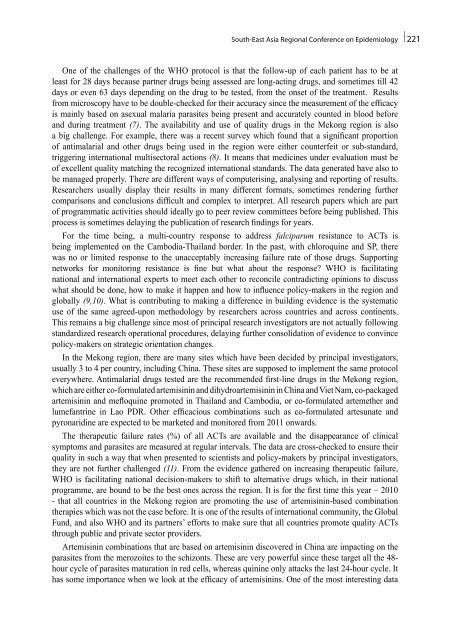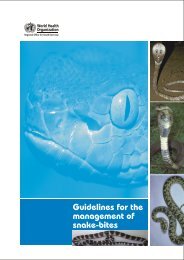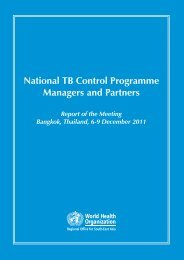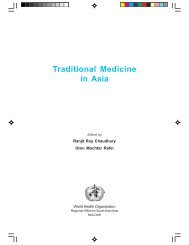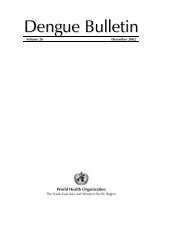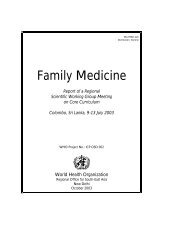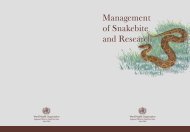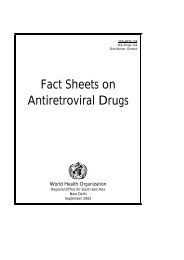South-East Asia Regional Conference on Epidemiology
South-East Asia Regional Conference on Epidemiology
South-East Asia Regional Conference on Epidemiology
Create successful ePaper yourself
Turn your PDF publications into a flip-book with our unique Google optimized e-Paper software.
<str<strong>on</strong>g>South</str<strong>on</strong>g>-<str<strong>on</strong>g>East</str<strong>on</strong>g> <str<strong>on</strong>g>Asia</str<strong>on</strong>g> <str<strong>on</strong>g>Regi<strong>on</strong>al</str<strong>on</strong>g> <str<strong>on</strong>g>C<strong>on</strong>ference</str<strong>on</strong>g> <strong>on</strong> <strong>Epidemiology</strong> | 221<br />
One of the challenges of the WHO protocol is that the follow-up of each patient has to be at<br />
least for 28 days because partner drugs being assessed are l<strong>on</strong>g-acting drugs, and sometimes till 42<br />
days or even 63 days depending <strong>on</strong> the drug to be tested, from the <strong>on</strong>set of the treatment. Results<br />
from microscopy have to be double-checked for their accuracy since the measurement of the efficacy<br />
is mainly based <strong>on</strong> asexual malaria parasites being present and accurately counted in blood before<br />
and during treatment (7). The availability and use of quality drugs in the Mek<strong>on</strong>g regi<strong>on</strong> is also<br />
a big challenge. For example, there was a recent survey which found that a significant proporti<strong>on</strong><br />
of antimalarial and other drugs being used in the regi<strong>on</strong> were either counterfeit or sub-standard,<br />
triggering internati<strong>on</strong>al multisectoral acti<strong>on</strong>s (8). It means that medicines under evaluati<strong>on</strong> must be<br />
of excellent quality matching the recognized internati<strong>on</strong>al standards. The data generated have also to<br />
be managed properly. There are different ways of computerising, analysing and reporting of results.<br />
Researchers usually display their results in many different formats, sometimes rendering further<br />
comparis<strong>on</strong>s and c<strong>on</strong>clusi<strong>on</strong>s difficult and complex to interpret. All research papers which are part<br />
of programmatic activities should ideally go to peer review committees before being published. This<br />
process is sometimes delaying the publicati<strong>on</strong> of research findings for years.<br />
For the time being, a multi-country resp<strong>on</strong>se to address falciparum resistance to ACTs is<br />
being implemented <strong>on</strong> the Cambodia-Thailand border. In the past, with chloroquine and SP, there<br />
was no or limited resp<strong>on</strong>se to the unacceptably increasing failure rate of those drugs. Supporting<br />
networks for m<strong>on</strong>itoring resistance is fine but what about the resp<strong>on</strong>se? WHO is facilitating<br />
nati<strong>on</strong>al and internati<strong>on</strong>al experts to meet each other to rec<strong>on</strong>cile c<strong>on</strong>tradicting opini<strong>on</strong>s to discuss<br />
what should be d<strong>on</strong>e, how to make it happen and how to influence policy-makers in the regi<strong>on</strong> and<br />
globally (9,10). What is c<strong>on</strong>tributing to making a difference in building evidence is the systematic<br />
use of the same agreed-up<strong>on</strong> methodology by researchers across countries and across c<strong>on</strong>tinents.<br />
This remains a big challenge since most of principal research investigators are not actually following<br />
standardized research operati<strong>on</strong>al procedures, delaying further c<strong>on</strong>solidati<strong>on</strong> of evidence to c<strong>on</strong>vince<br />
policy-makers <strong>on</strong> strategic orientati<strong>on</strong> changes.<br />
In the Mek<strong>on</strong>g regi<strong>on</strong>, there are many sites which have been decided by principal investigators,<br />
usually 3 to 4 per country, including China. These sites are supposed to implement the same protocol<br />
everywhere. Antimalarial drugs tested are the recommended first-line drugs in the Mek<strong>on</strong>g regi<strong>on</strong>,<br />
which are either co-formulated artemisinin and dihydroartemisinin in China and Viet Nam, co-packaged<br />
artemisinin and mefloquine promoted in Thailand and Cambodia, or co-formulated artemether and<br />
lumefantrine in Lao PDR. Other efficacious combinati<strong>on</strong>s such as co-formulated artesunate and<br />
pyr<strong>on</strong>aridine are expected to be marketed and m<strong>on</strong>itored from 2011 <strong>on</strong>wards.<br />
The therapeutic failure rates (%) of all ACTs are available and the disappearance of clinical<br />
symptoms and parasites are measured at regular intervals. The data are cross-checked to ensure their<br />
quality in such a way that when presented to scientists and policy-makers by principal investigators,<br />
they are not further challenged (11). From the evidence gathered <strong>on</strong> increasing therapeutic failure,<br />
WHO is facilitating nati<strong>on</strong>al decisi<strong>on</strong>-makers to shift to alternative drugs which, in their nati<strong>on</strong>al<br />
programme, are bound to be the best <strong>on</strong>es across the regi<strong>on</strong>. It is for the first time this year – 2010<br />
- that all countries in the Mek<strong>on</strong>g regi<strong>on</strong> are promoting the use of artemisinin-based combinati<strong>on</strong><br />
therapies which was not the case before. It is <strong>on</strong>e of the results of internati<strong>on</strong>al community, the Global<br />
Fund, and also WHO and its partners’ efforts to make sure that all countries promote quality ACTs<br />
through public and private sector providers.<br />
Artemisinin combinati<strong>on</strong>s that are based <strong>on</strong> artemisinin discovered in China are impacting <strong>on</strong> the<br />
parasites from the merozoites to the schiz<strong>on</strong>ts. These are very powerful since these target all the 48hour<br />
cycle of parasites maturati<strong>on</strong> in red cells, whereas quinine <strong>on</strong>ly attacks the last 24-hour cycle. It<br />
has some importance when we look at the efficacy of artemisinins. One of the most interesting data


